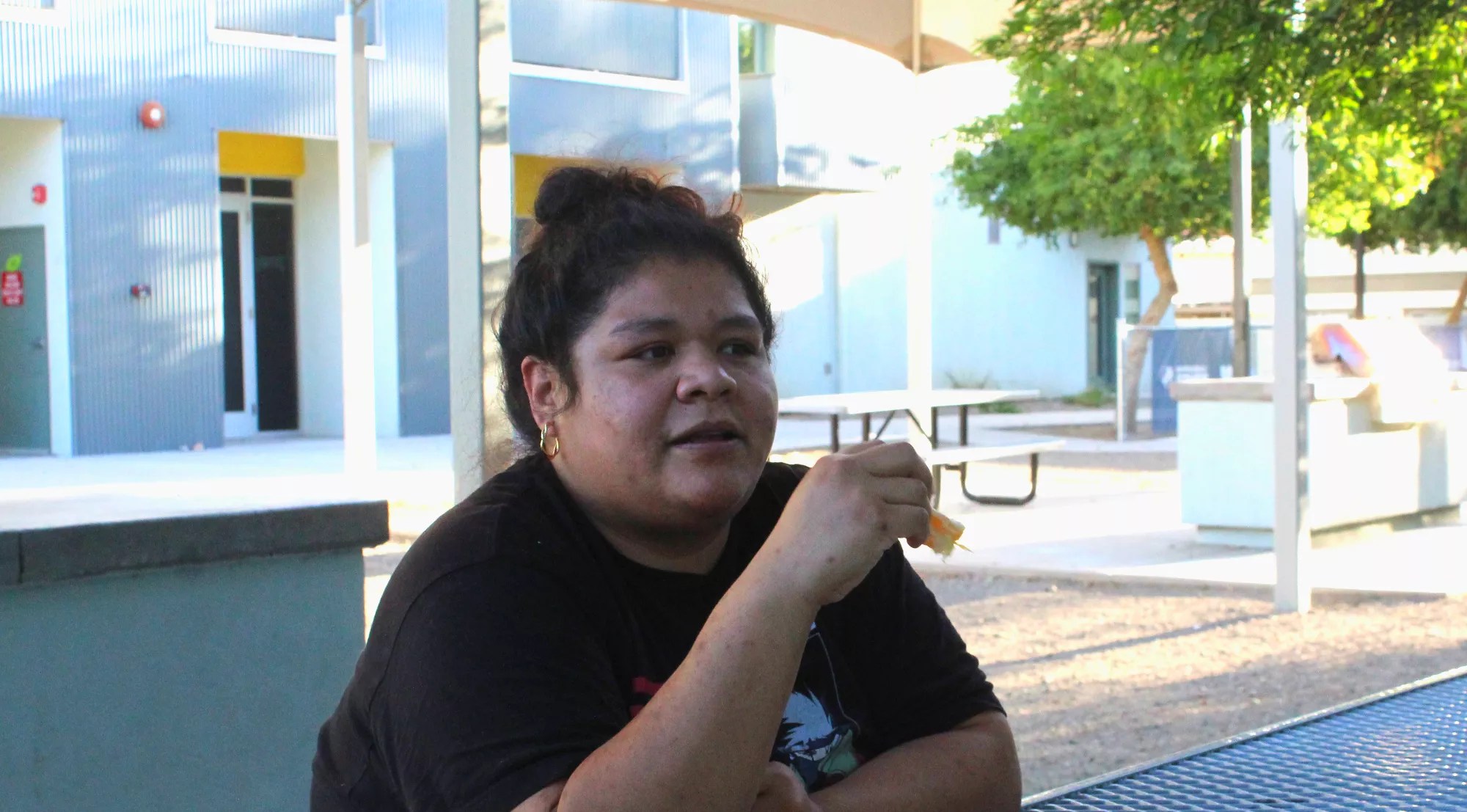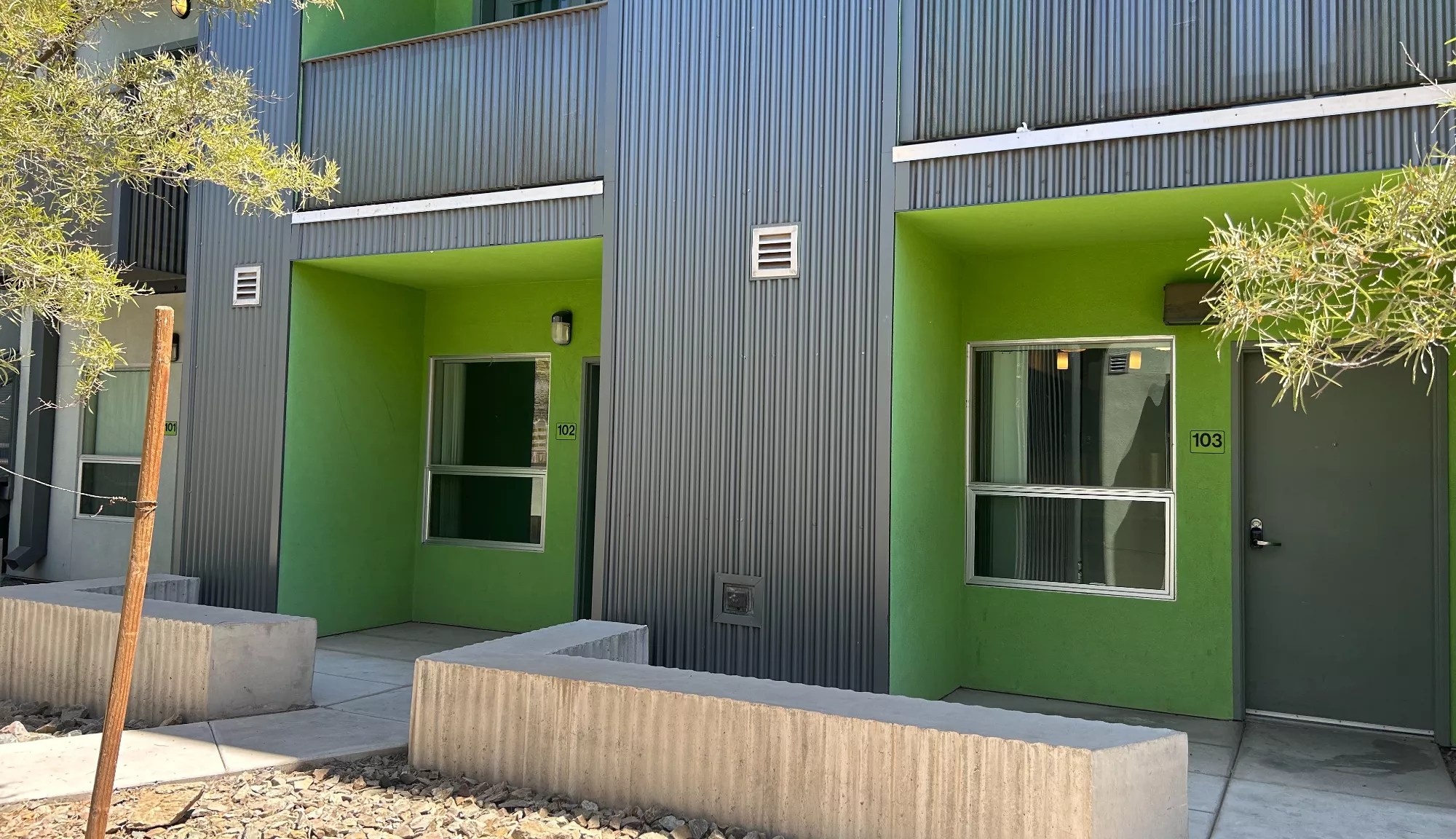
TJ L’Heureux

Audio By Carbonatix
A month ago, Jacquelyne Rubio had a place to live, at least for a little while longer. Seven months pregnant, she and her boyfriend and 6-year-old son had a slot at the La Mesita shelter in Mesa, run by the nonprofit A New Leaf.
Then one day in late June, the shelter abruptly kicked them out.
“They gave us until tomorrow,” Rubio told Phoenix New Times outside the shelter on June 24. “I was like, ‘We’ve got nowhere to go.'”
According to Rubio, the shelter told her it was closing due to financial issues stemming from expected cuts in federal funding. Rubio had initially been told she could stay until August, but now she had to leave on very short notice. She had not lined up another place to live, though Tempe unhoused advocate Austin Davis helped the family secure a hotel room, where they are still living while they search for more permanent housing.
A New Leaf disputes Rubio’s account, although the nonprofit’s version of events has been inconsistent.
Tanner Swanson, a communications manager for A New Leaf, told New Times in June that Rubio and her family had to leave for the same reason most of La Mesita’s shelter recipients do – they had stayed the maximum of four months. However, the family said they had been living in the shelter since April, showing New Times a letter from the shelter that confirmed they initially were scheduled to stay until August.
When New Times asked about the letter, Swanson said the family “successfully secured housing sooner than expected” and did not need to stay the full four months. Citing the nonprofit’s “case management notes,” Swanson said the family “exited the program into stable housing, with employment.”
That, too, appears to be incorrect. Rubio said the family did not have stable housing on the eve of their expulsion (and lacks it still). Swanson declined to provide the case management records in question, which he said “clearly indicate” the family had stable housing lined up. He insisted that the nonprofit “collaboratively arranged” the housing transition.
Rubio and her boyfriend, Jordan Hackeborn, said shelter was not particularly helpful in finding them housing. “When we met with (them) every time for the last two weeks, it was just a two-minute conversation – in and out,” Rubio said. “It was just three questions: Any news? How much money do you have saved? And have you worked out Department of Economic Security daycare?”
Hackeborn said housing options were extremely limited.
“The case manager doesn’t help us finding a place,” he said on June 24, before the family left the shelter. “We’ve tried everything we possibly can.”
Rubio said she asked A New Leaf office for written documentation of the request to leave early but was not provided any. Swanson did not dispute that no such documentation was sent to her.

Units at the La Mesita shelter in Mesa.
TJ L’Heureux
Funding issues
Swanson said the shelter had to be closed because it was operating in the red. “There have been chronic state, federal and city cutbacks,” he told New Times. “We know federal cuts are coming down the pike, and this place was close to half a million in the hole.” He added that the debt has always been “substantial” but it was “starting to compromise other facilities.”
In its last financial report – which covers the fiscal year that ended June 30, 2024 and not the current period – A New Leaf operated slightly in the red, with $43 million in revenue and $45 million in expenses. But it increased its net assets during that time from $22 million to $35 million by acquiring land, buildings and equipment. Its CEO made about $290,000.
Swanson said the La Mesita shelter – which included 16 private apartment-style units for families – had been around since the 1980s or ’90s and was renovated in 2016. The units will now be rented out as affordable housing units. Tenants will be charged rent based on their income level.
In a press release, A New Leaf said the shelter served 49 families – 85 adults and 112 children – in the past year. As an affordable housing complex, La Mesita will house about 64 people annually.
“While we are temporarily converting these units to meet the increasing need for long-term affordable housing, this does not have to be a permanent shift,” Laura Bode, A Nee Leaf’s chief philanthropy officer, said in the release. “If funding priorities or community needs change, we are prepared to reevaluate and potentially reinstate emergency shelter services at La Mesita.”
Rubio has since found a job at McDonald’s and as a cleaner, but she said her stress-induced seizures and diabetes have been exacerbated due to juggling the housing ordeal with hospital visits for pregnancy complications.
“I’m pregnant, have a six-year-old, I’m about to be homeless, it’s hot as shit outside, and I’m already an over-thinker,” she said.
Her due date is in September. On Tuesday, she said the family is trying to save up while living out of the hotel.
“We are just trying to stay as positive as we can about the situation,” she said.